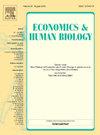State-led regional development strategy and multidimensional health poverty of the residents: Evidence from the China’s great western development program
IF 1.8
3区 医学
Q2 ECONOMICS
引用次数: 0
Abstract
This study systematically examines the impact of China's Great Western Development (GWD) program on residential multidimensional health poverty from an institutional beneficiary perspective. Using macro and micro data, we employ a spatial regression discontinuity (SRD) approach to identify causal effects. The results indicate that the GWD program reduces both health poverty incidence and intensity, with findings remaining robust across multiple tests. However, the program shows no significant effects on rural residents, the elderly, residents of small- and medium-sized districts, or those in non-priority districts, likely due to size, urban, political, and efficiency biases. Mechanism analysis suggests that education, social security, healthcare, employment, transportation, energy and environmental management, and economics (at the macro level) drive the program's impact on health poverty. Finally, we identify higher education and physician supply as areas for further improvement. Given these findings, we recommend continued promotion of the GWD program to address its limitations and advance the goal of common prosperity.
国家主导的区域发展战略与居民多维健康贫困:来自中国西部大开发的证据
本研究从制度受益人的角度系统考察了中国西部大开发(GWD)计划对居民多维健康贫困的影响。使用宏观和微观数据,我们采用空间回归不连续(SRD)方法来确定因果关系。结果表明,GWD计划降低了健康贫困的发生率和强度,多项测试的结果仍然稳健。然而,该计划对农村居民、老年人、中小地区居民或非优先地区的居民没有显著影响,可能是由于规模、城市、政治和效率方面的偏见。机制分析表明,教育、社会保障、医疗、就业、交通、能源和环境管理以及经济(宏观层面)推动了该计划对健康贫困的影响。最后,我们确定高等教育和医生供应是进一步改善的领域。鉴于这些发现,我们建议继续推进全球发展计划,以解决其局限性,推进共同繁荣的目标。
本文章由计算机程序翻译,如有差异,请以英文原文为准。
求助全文
约1分钟内获得全文
求助全文
来源期刊

Economics & Human Biology
医学-公共卫生、环境卫生与职业卫生
CiteScore
4.50
自引率
12.00%
发文量
85
审稿时长
61 days
期刊介绍:
Economics and Human Biology is devoted to the exploration of the effect of socio-economic processes on human beings as biological organisms. Research covered in this (quarterly) interdisciplinary journal is not bound by temporal or geographic limitations.
 求助内容:
求助内容: 应助结果提醒方式:
应助结果提醒方式:


